|
1.
CENTRAL AND WEST AFRICA
Regional round-up
Gabon
The government has instructed Provincial Forestry
Directors to ensure that operators pay the 2024 land tax,
failure to comply may result operations being halted. The
following text is said to have been sent directly from the
Forestry Department to companies:
"Forestry companies subject to the area tax and having
paid their debt in full or in part are requested to submit,
before June 21, 2024 to the General Directorate of Forests
(DGF), the payment receipts for the 2024 fiscal year.
Furthermore, the area tax collection orders for 2024 that
have not been collected since 5 March 2024 available."
Additionally, there is a new regulation on the limitation of
truck weight per axle. This measure, aligned with CEMAC
standards, seeks to protect aging bridges, including the
two 40-year-old bridges in Kango.
Trucks carrying logs can operate from 06:00 to 12:00hrs
and then must park for 2 hours after which they can
continue to operate between 14:00 to 18:00hrs.
See: https://www.gabonreview.com/infrastructures-routieres-les-
camions-de-plus-de-13-tonnes-a-lessieu-bientot-interdits-sur-la-
nationale/
Frequent electricity disruptions continue to plague
operators in the Special economic Zone. The local
electricity provider, SEEG, has promised improvements
by the end of the month.
Operators report stable demand from China for bilinga,
ayous and okan. Buyers in the Philippines and Middle East
have increased inquiries.
Cameroon
The season's first heavy rains have been reported but
harvesting operations are not yet affected. Trucking
operations and railway conditions are currently stable
without major disruptions. Sawmills are building stocks in
anticipation of the advancing six-month rainy period.
Demand in the Middle East remains stable and China has
resumed purchasing various species such as bilinga,
padouk, iroko, movingui and sapelli.
Operators report road and railway operations to the port
are functioning well with no significant changes in fees or
tolls. Also, container availability is good with enough
empty containers on hand. Port operations at Douala and
Kribi are running normally. Douala Port handles general
goods while Kribi mainly handles containers.
Order levels are reported as stable, supported by the
Chinese market. Demand from China is improving
especially for species such as ayous. The Middle East
market is still slow with a focus on species such as iroko
and sapelli.
Republic of Congo
In North Congo the rains are subsiding allowing for
improved transportation to Douala Port which is closer
than Pointe Noire in the South. The distance to Pointe
Noire is approximately 1,400 km making it a long journey
across the country.
In the South rains are still prevalent but the dry period is
expected soon. Harvesting activities are resuming
especially for okoume driven by renewed Chinese
demand. There is also demand for other species such as
padouk, bilinga, movingui, sapelli and okan.
Transport to the south, particularly Pointe Noire, is mostly
on paved roads. Logs are transported to the Malukou log
parks and floated before being transported by train to
Pointe Noire Port. Operators near Pointe Noire also truck
logs directly to the port.
Operators say order levels have been stable for the past
two months. Although log exports were originally banned
quotas are currently allowed due to the economic situation.
Old stocks can still be exported and there are significant
stocks in North Congo which are being exported through
Douala Port.
Enquiry levels are also stable with the Philippines
resuming purchases of okoume sawnwood. China's
purchases of okoume, bilinga, movingui and Padouk have
increased.
In early July an international forestry conference will be
held hosted by the Minister of Forestry, Dr. Rosalie
Matondo. The programme will cover reforestation and
afforestation policies, reducing felling permits for
operators and developing downstream products for
international markets. Representatives from Congo Basin
countries and Equatorial Guinea have been invited.
See: https://gouvernement.cg/conference-internationale-sur-
lafforestation-et-le-reboisement/
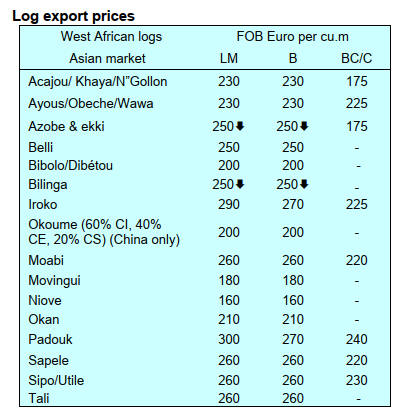
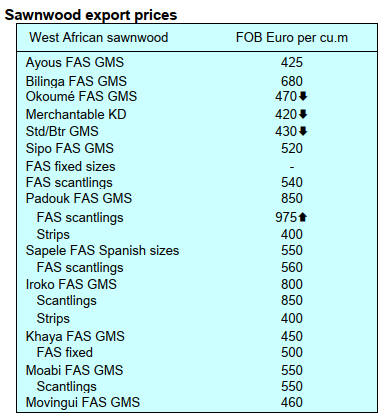
Through the eyes of industry
The latest GTI report lists the challenges identified by the
private sector in the Republic of Congo and Gabon.
GGSC
https://www.itto-ggsc.org/static/upload/file/20240620/1718839024156844.pdf
2.
GHANA
Eur29.31 million from wood product exports
According to a Timber Industry Development Division
(TIDD) report Ghana earned Eur 29.31 million from the
export of primary, secondary and tertiary wood products
which totalled 64,141cu.m in the first three months of
2024. Disappointingly, first quarter 2024 export volumes
and values were each down around 13% compared to the
same period in 2023.
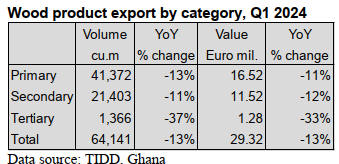
The table above shows that, year on year, the volume and
value for all products fell in the first quarter of this year.
While there has been a weakening of demand, another
reason cited was the unavailability of raw materials for
production and the impact of power outages on
production.
According to the TIDD report, primary products
contributed Eur16.52 million (56%) of the total value of
exports between January and March 2024, around the
same percent as in the same period in 2023.
The primary products were sawnwood, teak logs, billets,
boules, kindling and roll board.
Secondary wood products were ranked second with a 39%
share of the export value. These products included
plywood, veneer and briquettes. The tertiary products
comprised mouldings and dowels. Saudi Arabia was the
main importer of plywood from Ghana.
Asian markets maintained their position as the top
destination for Ghana's wood product exports in the first
quarter of this year. Ghana earned Eur15.79 million from
the export of 40,149 cu.m of wood products to Asian
markets. This performance was better than in the same
period last year when exports to Asian markets also
contributed Eur 17.84 million. The key markets in Asia
were India, Vietnam and China.
The European market was Ghana’s second highest export
destination but accounted for only around 20% of first
quarter 2024 export earnings compared to the 24%
recorded for the first quarter 2023. The main European
markets for Ghana were Belgium, Germany, UK, France
and Denmark.
Products shipped to the EU market included sawnwood,
veneers, boules, plywood and processed mouldings
produced from eucalyptus, papao/ apa, dahoma, kako/
ekki, chenchen, niangon, sapele, odum, guarea,
asanfina/anigre, koto/kyere and ananta
The African regional markets were placed third with most
being shipped to ECOWAS member countries (Burkina
Faso, Togo, Niger, Mali, Senegal, Benin, Nigeria and
Sierra Leone). The leading products shipped to the
regional markets were air and kiln dry sawnwood, veneers
and plywood.
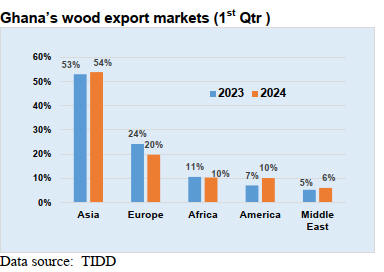
Miro Forestry doubling plywood production capacity
Miro Forestry and Timber Products, the parent company
of Miro Forestry Ghana Limited, has announced that it has
procured equipment to double its plywood capacity in
Ghana.
The company produces plywood, edge glue boards and
utility transmission poles from its own FSC-certified
commercial forests.
The company has reported it has 200,000 tonnes of carbon
credits available per annum from its existing plantations
across Africa and has a several afforestation projects
generating carbon credits.
According to the Timber Industry Development Division
(TIDD) statistics the total export volume of plywood by
Miro Forestry Ghana Limited was 4,182 cu.m in 2022 and
12,146 cu.m in 2023.
In the first quarter of this year plywood exports by sea
accounted for 94% (3,465cu.m) of the total exported
valued at Eur1.24 million. The main wood raw material
for Miro’s plywood production is eucalyptus.
See: https://www.timberindustrynews.com/miro-forestry-and-
timber-products-doubles-plywood-production-in-ghana/
Eurobond debt restructuring completed
The government of Ghana has successfully negotiated an
agreement in principle on the terms of debt restructuring
with Eurobond investors involving approximately US$13
billion of debt.
The deal is the latest sovereign debt restructuring launched
under a G20-approved ‘common framework’ after the
process suffered many delays. The IMF described the
agreement as "a significant positive step" for Ghana. The
committee representing its international bondholders said
it would give the country a path to economic recovery.
The agreement means the IMF board is expected to
approve the next US$360 million tranche of Ghana's US$3
billion support programme.
See:
https://www.ghanaweb.com/GhanaHomePage/business/Ghana-
secures-debt-restructuring-agreement-with-Eurobond-holders-
investors-to-take-37-haircut-1936995
Increase in foreign investment
The Ghana Investment Promotion Centre (GIPC) has
reported a 16% increase in foreign investment for the first
quarter of 2024 totalling US$123.06 million. This marks a
significant rise from the US$106.02 million recorded in
the same period last year.
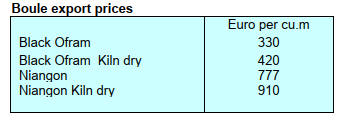
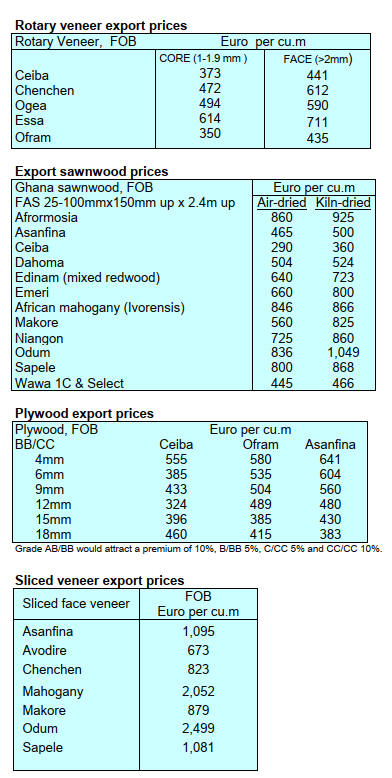
3. MALAYSIA
Achieving net zero requires a collaborative effort - PM
Malaysian Prime Minister, Anwar Ibrahim, has said
achieving net zero requires a collective effort and a shift in
mindset because adopting environmental, social and
governance (ESG) practices requires more than just
regulatory compliance.
He said it is crucial to recognise that achieving net zero
requires a collaborative effort involving the government,
the private sector and all Malaysians. Anwar urged all
stakeholders, including businesses, civil society and
individuals to actively participate in achieving a
sustainable and secure future for the next generation.
He added, Malaysia has taken a progressive stance
towards decarbonisation and the larger sustainability
agenda and the government has implemented policies
aimed at reducing carbon emissions, promoting social
equity, creating new growth opportunities in the green
economy and ensuring transparent governance.
See:
https://www.thestar.com.my/news/nation/2024/06/22/anwar-
urges-collaboration-for-net-zero-
goals#:~:text=KUALA%20LUMPUR%3A%20Achieving%20ne
t%20zero,says%20Datuk%20Seri%20Anwar%20Ibrahim
Challenging prospects in international furniture market
The outlook for the furniture industry in Malaysia remains
challenging with, it appears, few opportunities to increase
exports in the second half of the year.
Analysts suggest the main reason for the stagnant trade in
furniture exports lies in Malaysia’s largest export
destination, the United States. Existing home sales in the
United States fell to the lowest levels in 13 years in
October 2023 as high mortgage rates and lack of homes
for sale drove buyers from the market. In addition, home
re-sales, which account for a significant part of housing
sales, were 15% lower year-on-year in October 2023.
The weak housing market in the US contributed to the
slump in furniture exports, in particular, wooden furniture
exports. Most wooden furniture manufacturers in
Malaysia export their products to the US. Demand in the
ASEAN market is being affected by rising inflationary
pressure which means consumers tend to defer spending
on non-essential such as furniture.
See:https://www.thestar.com.my/business/business-
news/2024/06/15/local-furniture-export-outlook-hinges-on-us-
housing-
market#:~:text=THE%20outlook%20for%20the%20furniture,86
bil%20in%202022.
Rekindling discussions on a Malaysia-EU FTA
The European Union (EU) and Malaysia need to assess
global trends over the last decade before resuming the free
trade agreement (FTA) talks according to media reports of
statements by Timo Goosmann, Deputy Head of the
Delegation of European Union to Malaysia.
In 2010 a FTA was signed by the two parties but was put
on hold after eight rounds of negotiations at Malaysia’s
request. In March this year, Prime Minister Anwar
Ibrahim said the time is now “ripe” for Malaysia to
rekindle discussions on a Malaysia-EU FTA.
Goosmann reportedly said “I am very optimistic that if we
find a way to agree on the conditions to start these
negotiations then we can possibly find a good way on how
to agree on a meaningful FTA that creates opportunities
and prosperity for both sides”.
See: https://www.thestar.com.my/business/business-
news/2024/06/25/malaysia-and-eu-should-evaluate-changes-
before-resuming-fta-
talks#:~:text=PETALING%20JAYA%3A%20The%20European
%20Union,Malaysia%20deputy%20head%20Timo%20Goosmann
Sabah TLAS to be updated
Sabah’s timber industry is to update its sustainability
procedures to match with the requirements set out in the
EUDR. This comes after the Sabah Forestry Department
and the European Union officially launched a partnership
to update the Sabah Timber Legality Assurance System
(TLAS) to improve competitiveness and to enhance
environmental governance.
Over the past decade the Sabah TLAS has played a pivotal
role in gaining international acceptance in key timber trade
markets including Europe, Australia, the United States,
Japan and South Korea.
The TLAS updating exercise will involve alignment of the
Sabah TLAS with the European Union Deforestation
Regulation (EUDR). In addition to EUDR the Sabah
TLAS will also align with the EU Corporate Sustainability
Due Diligence Directive (CS3D).
The updating exercise will involve a series of
consultations and workshops with government agencies of
the Implementing Agencies Coordination Committee
(IACC), the Sabah Timber Industries Association (STIA),
the Timber Association of Sabah (TAS) and timber
companies.
See: https://www.theborneopost.com/2024/06/19/sabah-forestry-
eu-launch-groundbreaking-
partnership/#:~:text=KOTA%20KINABALU%20(June%2019)%
3A,Legality%20Assurance%20System%20(TLAS)%20to
Through the eyes of industry
The latest GTI report lists the challenges identified by the private sector
in Malaysia.
GGSC
https://www.itto-ggsc.org/static/upload/file/20240620/1718839024156844.pdf
4.
INDONESIA
Furniture contracts at Dubai expo
Indonesian furniture products worth US$6.11 million were
sold during the INDEX exhibition in Dubai according to
the Ministry of Trade. The ministry's director of export
development for manufactured products, Dewi Rokhayati,
said that Indonesian furniture products are popular in the
Middle East and Africa.
The products that were in demand included console tables,
chairs and stools made of wood and rattan, rattan baskets,
wall decorations, wooden outdoor furniture, decorative
accessories and kitchen items.
According to the Head of the Indonesian Trade Promotion
Center in Dubai, Widy Haryono, opportunities for
Indonesian furniture exports to the UAE can be increased.
Indonesia's participation in INDEX 2024 was an effort to
take advantage of the Indonesia-UAE CEPA trade
agreement and utilise Dubai as a hub for trade in the
region.
See: https://en.tempo.co/read/1879331/indonesian-furniture-
gains-us6-11mn-transactions-at-dubais-index-2024
Sustainable development of Cirebon's rattan sector
Enggartiasto Lukita, former Minister of Trade (2016-
2019) and Executive Chairman of B-Universe is
advocating the preservation and development of the rattan
craft industry in Cirebon. During his visit to a rattan
craftsmen and processing industry exhibition Enggar
emphasised the importance of maintaining and expanding
this traditional industry.
The rattan craft industry faced challenges when artisans
were asked to stop exporting raw rattan, a ban stipulated in
Minister of Trade Regulation No. 22 of 2023 regarding
Prohibited Export Goods.
Despite the dent to businesses Enggar noted that rattan
products from Cirebon are highly sought after in the
international market. Furthermore, Enggar emphasised that
design for comfort is a key aspect that must be addressed
in rattan products.
See: https://jakartaglobe.id/business/enggartiasto-lukita-urges-
sustainable-development-of-cirebons-rattan-sector
SFM - the foundation for achieving FOLU Net Sink 2030
Indonesia is leveraging its strong foundation in sustainable
forest management to meet its greenhouse gas (GHG)
emission reduction targets in the Forestry and Other Land
Use (FOLU) sector. This strategy was emphasised by
Agus Justianto, Chairman of Indonesia’s FOLU Net Sink
2030 Working Team from the Ministry of Environment
and Forestry (KLHK).
Agus detailed the implementation of sustainable forest
management, including strengthening Forest Management
Units (KPH) at the local level. The social forestry policy,
which has allocated 12.7 million hectares of forest land for
community management, also supports sustainable forest
management.
Agus highlighted the significant role of Forest Utilisation
Business Permits (PBPH) in achieving the FOLU Net Sink
target. PBPH is directed to implement the Multi-Business
Forestry (MUK) Model enabling business diversification
beyond timber to include energy plantations, ecotourism,
agroforestry, non-timber product utilisation, carbon
trading and environmental services.
See: https://agroindonesia.co.id/targetkan-folu-net-sink-
indonesia-punya-modal-kuat-pengelolaan-hutan-lestari/
Attracting investment in multi-business forestry
Multi-business Forestry (MUK) in Forest Management
Units (PBPH), as a green investment, appears attractive to
investors.
A total of 111 companies holding PBPH have been
registered to implement MUK with 75 units having
received approval from the Minister of Environment and
Forestry and 36 units are in the approval process.
Agus Julianto, the Vice Chairman of Indonesia's FOLU
Net Sink 2030 Working Team at the Ministry of
Environment and Forestry, explained by implementing
Multi-Business Forestry (PBPH) can diversify its business.
PBPH not only focuses on logging but can also develop
various other businesses such as energy plantation forests,
ecotourism, agroforestry and non-timber products
utilisation.
Implementing Multi-Business Forestry also opens up
opportunities for PBPH to enter the carbon trading and
environmental services businesses to obtain financial
incentives from forest conservation activities,
contributions to climate change mitigation and increased
environmental awareness. Agus said that MUK is a form
of green investment. He encouraged investors and
financial institutions to support green investment policies
by allocating funds and resources to sustainable projects.
See: https://agroindonesia.co.id/investasi-hijau-multi-usaha-
kehutanan-makin-diminati-investor-dukung-pencapaian-folu-net-
sink/
In related news, Indonesia has built several large-scale
nurseries to support forest, land and mangrove
rehabilitation activities as well as peat restoration. Large-
scale nurseries have been built in several places such as
Rumpin including in the National Capital of Nusantara
(IKN), said the Vice Chairman of Indonesia's FOLU Net
Sink 2030 Working Team, Agus Justianto.
According to Agus through establishing large-scale
nurseries the government is opening up opportunities for
private entities to contribute through Government
Cooperation with Business Entities (KPBU) or Public
Private Partnership (PPP) schemes.
See: https://forestinsights.id/akselerasi-folu-net-sink-indonesia-
siapkan-persemaian-bibit-skala-besar-untuk-rehabilitasi-lahan/
Communities have important role in productive forest management
Communities are important in productive and sustainable
forest management says the Secretary General of the
Ministry of Environment and Forestry (KLHK), Bambang
Hendroyono.
With the issuance of Law Number 6 of 2023, forest
management practices reflect the efforts to achieve
balance. This policy was strengthened by the issuance of
Presidential Regulation Number 28 of 2023 concerning
Integrated Planning for the Acceleration of Social Forestry
Management.
Bambang said communities were given the right to
manage forest areas in the same way as the permits given
to the private sector.
The community is provided with business development
facilitation, capital and assistance in managing forest areas
for welfare and sustainability.
See: https://www.rri.co.id/nasional/763056/klhk-masyarakat-
aktor-penting-dalam-pengelolaan-hutan-produktif
Increasing Gen-Z involvement in social forestry
The Ministry of Environment and Forestry (KLHK) is
supporting efforts to increase the involvement of youth,
including Generation Z, in various aspects of social
forestry. During an online event, Mahfudz, Director
General of Social Forestry and Environmental Partnership
(PSKL) at the ministry invited the younger generation to
get involved in social forestry schemes.
The young generation can act as assistants or young
entrepreneurs who can create new jobs and bigger
businesses. They can also help with the marketing and
development of forest products from social forestry
business groups.
See: https://en.antaranews.com/news/316629/support-increasing-
gen-z-involvement-in-social-forestry-ministry
Social forestry business transactions exceed target
The business value created by of social forestry business
groups that manage social forestry reached IDR1.13
trillion in 2023 according to the Minister of Environment
and Forestry (LHK), Siti Nurbaya Bakar, who added this
exceeded the target set at IDR1 trillion. "In 2024, the
economic value target will be increased to IDR 1.5
trillion," said Siti in the online Workshop of Social
Forestry Synergy.
Siti added that economic improvement of the communities
that manage social forestry also impacts the villages and
the region. Studies show the impact of social forestry on
various aspects such as increasing income, employment
and land cover.
Director General of Social Forestry and Environmental
Partnerships in the Ministry of Environment and Forestry,
Mahfudz, said there are five main commodities in social
forest management coffee, honey, sugar palm, eucalyptus
and other food crops.
See: https://swa.co.id/read/447875/pacu-ekonomi-desa-target-
nilai-ekonomi-di-program-perhutanan-sosial-di-2024-senilai-
rp15-triliun
and
https://www.beritasatu.com/nasional/2823774/perhutanan-sosial-
miliki-nilai-transaksi-ekonomi-rp-113-triliun
Need for increased awareness on monetisation carbon trading
The Financial Services Authority recorded transaction
values on the Indonesia Stock Exchange (IDX) for Carbon
to be IDR36.77 billion. "As of 31 May 2024, 62 users
obtained permits with a total volume of 608,000 tonnes of
CO2 and the accumulated transaction value was IDR36.77
billion according to Inarno Djajadi, the Chief Executive of
Capital Market Supervision, Derivative Finance and the
OJK Carbon Exchange, in Jakarta yesterday.
However, the transaction value on the carbon exchange
tends to be minimal.
For comparison, as of 30 April 2024 the transaction value
on the carbon exchange was IDR 35.31 billion, with a total
of 57 users. This indicates that during the period April to
May transactions on the carbon exchange only increased
by IDR 1.46 billion with the number of users increasing by
five users.
The Ministry of Finance revealed the reason for the lack of
interest in the carbon exchange. Boby Wahyu Hernawan,
the Head of the Center for Climate Change and
Multilateral Financing Policy at BKF, stated that the low
level of transactions over the past eight months reflected
the public's inadequate awareness of climate change. He
emphasised the need for increased awareness of the
economic value of carbon and the potential for
monetisation and trading.
See: https://www.neraca.co.id/article/200264/transaksi-bursa-
karbon-capai-rp3677-miliar
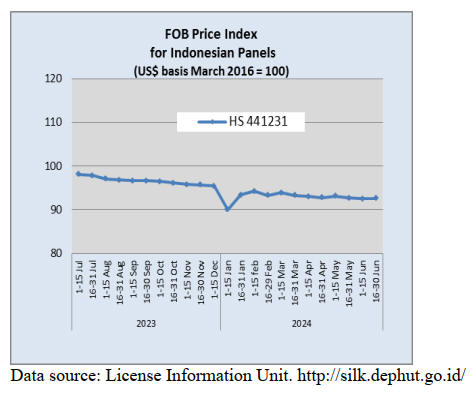
Through the eyes of industry
The latest GTI report lists the challenges identified by the
private sector in Indonesia.
GGSC
https://www.itto-ggsc.org/static/upload/file/20240620/1718839024156844.pdf
5.
MYANMAR
Record low timber exports
Myanmar reported US$67.855 million from timber exports
for the 2023-24 Financial Year (April 2023 to March
2024). This was the lowest level for the last two decades.
The Myanma Timber Enterprise (MTE) put about 3,000
tons of teak logs and about 2,000 tons of sawn and hewn
teak for tender in the second half of the 2023-2024
Financial Year. The result of tender was not announced.
According to exporters they are not expecting any quick
revival of the timber trade as long as external financial
sanctions on the MTE remain.
More labour recruits for Japan
The Myanmar Embassy in Japan said more than 380 Japan
companies will provide jobs for over 1,300 Myanmar
workers. According to the embassy Japanese companies
will recruit up to 560 Myanmar male workers and up to
760 Myanmar female workers. The Myanmar Embassy
has determined
See - https://www.gnlm.com.mm/japan-to-recruit-up-to-1300-
myanmar-workers/
Negative consequences of weak local currency
The Authorities have attempted to control retail rice prices
by arresting merchants. The crackdown led Yangon’s
largest rice wholesale market to effectively shut down
after the arrests were reported.
The Ministry of Information confirmed interrogation of
Myanmar Rice Federation members including its
chairperson for allegedly setting prices. Despite efforts to
cap prices, market rates remain higher than the official
price. Previous attempts by the authorities to control rice
prices resulted in market turmoil and current efforts face
skepticism from businesses.
See - https://www.irrawaddy.com/business/myanmars-generals-
take-another-shot-at-market-prices-and-hit-consumers.html
Conditions for a fair election - UN
The UN Secretary-General António Guterres on
Monday called for Member States to urge the military
leadership in Myanmar to respect the will and needs of its
own people as risks to regional stability grow.
Drawing attention to the military’s stated intention to hold
elections he highlighted intensifying aerial bombardment
and burning of civilian houses, along with ongoing arrests,
intimidation and harassment of political leaders, civil
society actors and journalists.
He said without conditions permitting the people of
Myanmar to freely exercise their political rights, “the
proposed polls risk exacerbating instability.”
See: https://news.un.org/en/story/2023/01/1133002
In related news, according to an independent UN human
rights report foreign banks are allegedly helping
Myanmar’s military acquire weapons and military
supplies, facilitating a “campaign of violence and
brutality” as the civil war continues
See: https://www.ohchr.org/
Suspicions traders seeking alternative routes for teak
exports
An EIA study suggests EU and US traders are seeking
alternative routes to acquire Myanmar teak from
merchants who provide falsified origin papers. This claim
is in a recent EIA report. The EIA says “according to
Eurostat, the EU’s statistical office, between June 2021
and December 2023, the EU imported more than Eur34
million worth of teak directly from Myanmar.
Notably, total teak imports from Myanmar into the EU
decreased from around Eur23.5 million in 2022 to just
over Eur3.8 million in 2023. While this is a positive
decrease in the trade this figure should be at zero.
And does this tailing off of direct trade mean demand for
teak has decreased? It is unlikely. EIA strongly believes
that Burmese teak is being shipped into EU and US
markets via other countries by traders who disguise the
wood’s true origin to circumvent sanctions”.
See: https://eia-international.org/blog/how-come-the-eu-and-us-
are-still-importing-blood-timber-from-myanmar-when-they-
introduced-sanctions-to-prevent-it/
sites/default/files/documents/hrbodies/hrcouncil/sessions-
regular/session56/a-hrc-56-crp-7.pdf
6.
INDIA
Plywood prices set to rise
A media release from Haryana Manufacturers Association
and an article in Plyreporter says that, because of the rising
prices for wood raw material, plywood prices must be
raised. Log prices are reported to be at an all time high in
Northern India with poplar and eucalyptus prices around
Rs.1800 (US$21.50) per quintal and Rs.1300 (US$14.50)
per quintal respectively.
The Plywood Manufacturers Association in Punjab State
decided members should increase prices of plywood by
5% with immediate effect. Members of Bihar State
Plywood Manufacturers Welfare Association also decided
to increase prices of plywood by 5%.
The Bangalore Plywood Manufacturers Association issued
a statement saying that the increase in production costs has
had a significant impact on industry making it difficult for
them to maintain the current pricing structure.
After consultation with the Kerala Plywood Association
the Kannur Plywood Association and Karnataka Plywood
Association decided that it is necessary to implement a
price increase. In effect it can be cocluded that there has
been a nationwide increase in plywood prices.
Source: media release from Haryana Manufacturers Association
and Plyreporter
See: https://www.plyreporter.com/article/153841/plywood-
associations-advise-a-price-hike-of-5-due-to-high-timber-cost
Demand for office space at a historical high
Cushman and Wakefield have released a report ‘India
Office Outlook 2024’ saying “2024 is likely to be a
significant year for India’s office market marked with
accelerated growth and renewed optimism. With domestic
office demand reaching a historical high of 74.7 mil. sq.ft
surpassing the previous record set in 2022 followed by
limited supply in core markets 2024 is the right year to
invest in tier 2 cities”.
A recent survey conducted by furniture & design
technology magazine of around 70 furniture and outfitting
firms and 135 architects and design firms concluded there
growth in the office market will be positive news for
quality and premium grade panel producers.
Plyreporter says “This change is resulting into growing
demand for high quality and better designed pre-laminated
boards and surfaces compared to what it was earlier. The
facts indicate a growth of 30% rise in quality prelam
particleboard consumption compared to 2020”.
See: https://www.cushmanwakefield.com/en/india/insights/india-
office-outlook
and
https://www.plyreporter.com/article/153914/particle-board-
market-expected-to-look-up-following-growing-office-space-
demand
Cost C&F Indian ports in US dollars, Hoppus measure
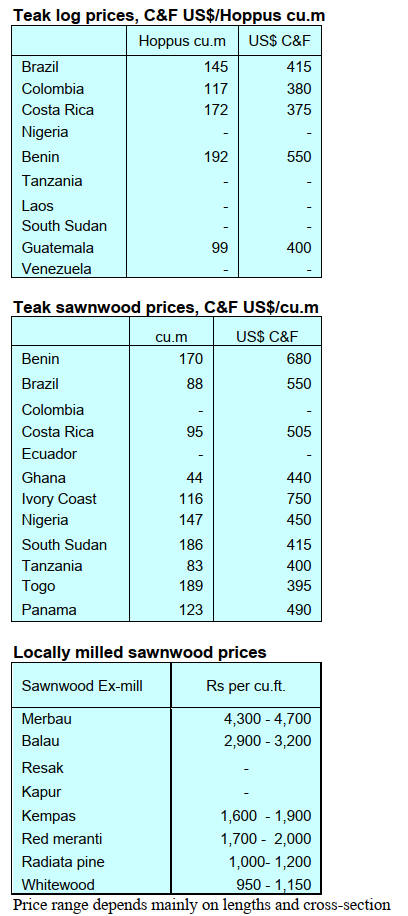
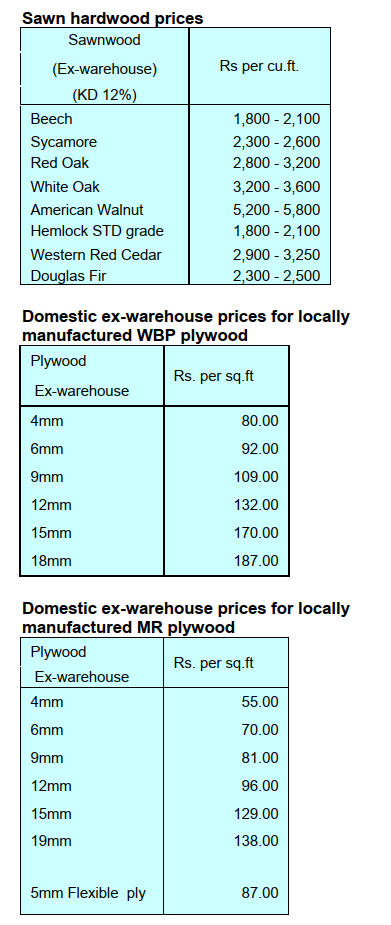
7.
VIETNAM
Wood and wood products (W&WP) trade
highlights
According to Vietnam Office of Customs data W&WP
exports to the EU in May 2024 reached US$42 million, up
45% compared to May 2023. In the first 5 months of 2024
W&WP exports to the EU totalled US$247.3 million, up
37% over the same period in 2023.
Vietnam’s woodchip exports in May 2024 were valued at
US$224 million, down 8% compared to April 2024 but up
67% compared to May 2023. In the first 5 months of 2024,
woodchip exports contributed US$1.08 billion, up 30%
over the same period in 2023.
Vietnam's pine imports in May 2024 were 75,500 cu.m
worth US$17.0 million, up 7% in volume and 7% in value
compared to April 2024.
Compared to May 2023, imports increased by 11% in
volume and 22% in value. In the first 5 months of 2024
pine imports were 302,900 cu.m, worth US$66.1 million,
up 44% in volume and 45% in value over the same period
in 2023.
Imports of raw wood (logs and sawnwood) from the US in
May 2024 amounted to 55,000 cu.m with a value of
US$24.0 million, up 7% in volume and 10% in value
compared to April 2024 bringing the total amount of raw
wood imported from the US in the first 5 months of 2024
to 249,290 cu.m with the value of US$107.29 million, up
15% in both volume and value over the same period in
2023.
In the first 5 months of 2024 W&WP exports earned
US$6.2 billion, up 24% over the same period in 2023 of
which the share of WP exports was US$4.2 billion, up
24% over the same period in 2023.
Vietnam's office furniture exports in May 2024 earned
US$25.7 million, up 18% compared to May 2023. In the
first 5 months of 2024 office furniture exports reached
US$117.6 million, up 11% over the same period in 2023.
Vietnam’s W&WP imports in May 2024 were valued at
US$247.8 million, up 6% compared to April 2024 and up
15% compared to May 2023. In the first 5 months of 2024
W&WP imports were valued at US$1.02 billion, up 20%
over the same period in 2023.
Vietnam's poplar imports in May 2024 were estimated at
29,500 cu.m worth US$11.1 million, up 7% in volume and
6% in value compared to April 2024. However, compared
to May 2023, imports dropped by 4% in volume and 21%
in value. In the first 5 months of 2024, poplar log and
sawnwood imports amounted to 132,200 cu.m, worth
US$49.4 million, up 19% in volume and 4% in value over
the same period in 2023.
Vietnam’s imports of logs and sawnwood from China in
May 2024 were reported at 92,000 cu.m with a value of
US$36.0 million, up 3% in volume and 1% in value
compared to April 2024 bringing the total imported from
China in the first 5 months of 2024 to 346,510 cu.m with a
value of US$134.99 million, up 71% in volume and 38%
in value over the same period in 2023.
Vietnam’s imports from the US increasing
According to statistics from Vietnam Customs imports of
raw wood (logs and sawnwood) from the US in April 2024
were 51,480 cu. m with a value of US$21.89 million,
down 25% in volume and 26% in value compared to
March 2024 but up 20% in volume and 13% in value over
the same period in 2023. In the first 4 months of 2024
imports of raw wood from the US reached 194,290 cu.m,
with a value of US$83.295 million, up 32% in volume and
28% in value over the same period in 2023.
In May 2024 Vietnam imported 55,000 cu.m of logs and
sawnwood with a value of US$4.0 million, up 7% in
volume and 10% in value compared to April 2024 bringing
the total amount of logs and sawnwood imported from the
US in the first 5 months of 2024 to 249,290 cu.m with a
value of US$107.29 million, up 15% year-on-year.
The increased imports of logs and sawnwood reflected the
recovery of W&WP consumption in major markets
especially the US, Japan, China, South Korea and the EU.
Wood raw material imports by category
Sawnwood imports
In April 2024 Vietnam imported 33,800 cu.m of
sawnwood from the US with a value of US$15.52 million,
down 23% in volume and down 28% in value compared to
March 2024 but up 17% in volume and 9% in value over
the same period in 2023. In the first 4 months of 2024
sawnwood imports from the US amounted to 125,150
cu.m, with a value of US$59.45 million, up 33% in
volume and 29% in value over the same period in 2023.
The average price of imported sawnwood in April 2024
was US$459/cu.m, down 6% compared to March 2024 and
down 7% over the same period in 2023. In the first 4
months of 2024 the average price of sawnwood from the
US stood at US$475/cu.m down 3% over the same period
in 2023. The price of imported poplar decreased by 8%,
ash decreased by 5%, maple decreased by 24% while oak
prices increased by 8% and walnut increased by 2%.
In April 2024 imports of poplar, oak, walnut and pecan
sawnwood decreased compared to March 2024. In
contrast, imports of sawn alder increased by 69% in
volume and 61% in value. Compared to the same period in
2023, imports of most sawnwood species from the US
decreased.
In the first 4 months of 2024 imports of many types of
sawnwood increased against the same period in 2023 for
example poplar imports increased by 23% in volume and
13% in value; oak increased by 29% and 40% respectively.
Alder import volumes and value increased by 129% and
118% respectively; maple increased by 94% and 48%
respectively. In contrast, walnut imports decreased slightly
by 5% in volume and by 3% in value.
Log imports
Imports of logs from the US in April 2024 reached 17,670
cu. m with a value of US$6.37 million, down 28% in
volume and 22% in value compared to March 2024 but up
27% in volume and 23% in value over the same period in
2023. In the first 4 months of 2024 log imports from the
US reached 69,120 cu. m with a value of US$23.7 million,
up 31% in volume and 27% in value over the same period
in 2023.
The mean price of logs imported from the US to Vietnam
in April 2024 was US$360/cu.m, up 8% compared to
March 2024 but down 3% year-on-year. In the first 4
months of 2024 the average price of logs imported from
the US was US$343/cu.m, down 3% over the same period
in 2023. The price of imported pine decreased by 9%, oak
decreased by 1%, walnut decreased by 21% and poplar
decreased by 33%.
In April 2024 imports of both pine and oak, the main
timbers imported from the US to Vietnam decreased
sharply compared to March 2024. Pine imports decreased
by 45% in volume and by 43% in value while oak log
imports decreased by 30% in volume and by 32% in value.
In contrast, walnut log imports increased 21% in volume
and 8% in value.
Wooden furniture dominates Vietnam’s exports to UK
Exports of wood and wood products to the UK in May
2024 earned US$16.5 million, up 5% compared to May
2023. In the first 5 months of 2024 W&WP exports to the
UK were valued at US$89.7 million, up 18% over the
same period in 2023.
In the first 4 months of 2024 wooden furniture exports to
the UK recorded positive growth, earning US$68 million,
up 24% over the same period in 2023 .
Over 90% of exports to the UK are of wooden furniture.
The majority of wooden furniture exports are doing well in
the UK except for kitchen furniture. In particular, wooden
doors exported to the UK in the first 4 months of 2024
surged by 30% over the same period in 2023.
The UK, with the population of 68 million, is seen as a big
market for wooden furniture made in Vietnam. With the
UKVFTA (UK-Vietnam Free Trade Agreement) and
CPTPP (Comprehensive snd Progressive Trans-Pacific
Partnership Agreement) in place Vietnamese operators
benefit fromreferential tariffs when shipping to the UK.
In addition, the UK’s recent recognition of Vietnam as a
market economy further favors Vietnamese exporters by
easing trade remedies that may be imposed on W&WPs
exported from Vietnam to UK.
Added value wood product exports to the UK, percent
share Jan-Apr 2024
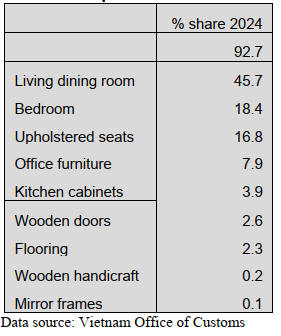
Vietnam plans to establish 238,000 hectares of forest
annually
The Saigon Times has reported Vietnam’s national plan
includes planting 238,000 ha of forest annually with the
aim of increasing the national forest cover at between 42
to 43%. This goal is outlined in the draft National Forestry
Planning for the 2021-2030 period, with a vision toward
2050.
According to the draft, the total forest and forestry land
area will be 15.85 million hectares divided into special-use
forests (15.5%), protection forests (33%) and production
forests (51.5%).The plan emphasises improving forest
quality, especially natural forests.
The forestry sector aims for an average annual growth rate
of 5% to 5.5% in added value from forestry production.
Vietnam also aims to increase the export value of wood
and forest products to US$20 billion by 2025 and US$25
billion by 2030. Domestic consumption is projected to
reach US$5 billion by 2025 and US$6 billion by 2030.
Revenue from forest environmental services is expected to
grow 5% annually, reaching VND3.5 trillion per year in
2021-2025 and VND4 trillion in 2026-2030.
The Ministry of Agriculture and Rural Development
estimates the total investment needed for the plan at
VND217.3 trillion, with nearly VND107 trillion required
for the 2021-2025 period.
The national forestry planning is one of four sectoral plans
prepared by the Ministry of Agriculture and Rural
Development.
See: https://english.thesaigontimes.vn/vietnam-wants-to-plant-
238000-hectares-of-forest-annually/
8. BRAZIL
Mato Grosso promotes event on forest management
The state of Mato Grosso held the 5th event on forest
management 20-21 June in Alta Floresta municipality in
the north of the State in the Amazon Region. The event
was organised by the Center of Timber Producing and
Exporting Industries of the State of Mato Grosso (CIPEM)
with support of the National Forum of Forest-Based
Activities (FNBF) and the Mato Grosso State Secretariat
for Economic Development (SEDEC).
The event aimed to promote the sustainable use of native
timber species. During the event participants visited forest
management areas to learn about the techniques used for
the conservation of native vegetation and the process of
harvesting and transporting trees in accordance with
environmental legislation. The visit concluded with
examination of industrial manufacture of sawnwood,
decking and wood panels.
Entrepreneurs and representatives of various institutions
such as the Brazilian Trade and Investment Promotion
Agency (ApexBrasil), the Brazilian Institute of
Environment and Renewable Natural Resources
(IBAMA), the National Environment Council
(CONAMA) and the government of Mato Grosso attended
the event.
The state of Mato Grosso currently has 5.2 million
hectares of forest under management areas with the
potential to expand to 6 million hectares. These forests are
sustainably managed and are contributing to carbon
absorption to aid mitigation of the effects of climate
change.
See: https://cipem.org.br/noticias/mato-grosso-promove-evento-
sobre-gestao-florestal
CO2 capture through commercial reforestation
Brazil is emphasising the importance of commercial
reforestation in its environmental planning for 2024 and
has launched three initiatives for the forestry sector.
Changes in legislation now favour forest plantations which
sequester carbon dioxide and when harvested reduce
pressure on natural forests.
According to a study conducted by the Totum Institute and
the Luiz de Queiroz College of Agriculture (ESALQ) a
tree in the Atlantic Forest can capture about 163.14 kg of
CO2 in its first 20 years contributing to the reduction of
greenhouse gases. In 2024 the National Plan for the
Development of Planted Forests was updated with
adjustments to strategies aimed at contributing to the
development of the planted forest chain in the country.
According to the National Plan Brazil has 10 million
hectares of planted forests with 6 million hectares of
protected area (4.75 million hectares of Legal Reserve
areas (LR) and 1.89 million hectares of Permanent
Preservation Areas (PPA).
The Government’s plan is part of a broad strategy to
reduce atmospheric greenhouse gas and is a contribution
to Brazil's Nationally Determined Contribution target of a
43% emissions reduction by 2030.
The activity is part of the Sectoral Plan for Mitigation and
Adaptation to Climate Change for the Consolidation of a
Low Carbon Emission Economy in Agriculture (ABC+
Plan) of the Ministry of Agriculture and Livestock, which
proposes the following programmes: Recovery of
Degraded Pastures; Crop-Livestock-Forest Integration and
Agroforestry Systems; Direct Planting System and
Biological Nitrogen Fixation.
Recently, forestry was deemed a non-polluting activity by
the Federal Government simplifying environmental
licensing and eliminating the need to pay environmental
fees for commercial forest planting.
See:
https://cartaodevisita.com.br/conteudo/50703/reflorestamento-
comercial-reduz-co2-e-ganha-destaque-no-planejamento-
ambiental-brasileiro
Export update
In May 2024 the Brazilian exports of wood-based products
(except pulp and paper) increased 2.7% in value compared
to May 2023, from US$328.3 million to US$337.0
million.
Pine sawnwood exports decreased 14% in value between
May 2023 (US$74.5 million) and April 2024 (US$64.1
million). In volume terms exports decreased 11% over the
same period, from 306,300 cu.m to 271,300 cu.m.
Tropical sawnwood exports decreased 18 % in volume,
from 29,000 cu.m in May 2023 to 23,900 cu.m in May
2024. In value, exports decreased 36 % from US$14.9
million to US$9.6 million, over the same period.
As for tropical plywood, exports increased in volume by
9% and in value by 11%, from 3,200 cu.m and US$1.9
million in May 2023 to 3,500 cu.m and US$2.1 million in
May 2024, respectively.
As for wooden furniture the exported value increased from
US$52.1 million in May 2023 to US$54.6 million in May
2024, an increase 5% during the period.
Opportunities in the Indian furniture market
In the search for new trade partnerships, India, with its
robust economy and vast population, emerged as a
promising market for Brazilian furniture. This was the
conclusion of a recent report "Study of Opportunities for
the Brazilian Exporters of Furniture and Mattresses –
Target Country: India," developed by IEMI. This says
demand for furniture in the country has increased
significantly with domestic consumption reaching
approximately US$21.7 billion in 2022, a growth of 28%
since 2018. Imports also show a post-pandemic recovery
with an increase of 7% in 2022 compared to 2021.
Despite an 8% growth in Brazilian exports to India
between 2006 and 2022 there has been a sharp decline in
recent years. However, the IEMI study suggests a large
untapped potential, especially for high-end and higher
value-added products such as wooden furniture which
accounted for 87.9% of Brazilian exports in 2022.
Initiatives such as the Prospective Mission, suggested by
the Brazilian Furniture Project, aim to expand the presence
of Brazilian furniture in India taking advantage of the
tariff reduction provided by the Mercosur-India
agreement. It was concluded that Brazilian industries have
a strategic opportunity to diversify their export markets
and capture a significant share of Indian demand
promoting internationalisation and the recognition of
Brazilian quality and design.
See: https://abimovel.com/com-foco-na-maior-populacao-do-
mundo-estudo-do-brazilian-furniture-elenca-oportunidades-para-
as-industrias-brasileiras-de-moveis-e-colchoes-no-mercado-
indiano/
Future of the timber industry in Brazil
During a recent WoodFlow podcast forestry and timber
industry experts discussed the need for the creation of a
national agenda for the timber production chain
highlighting the importance of a sustainable management
plan that encompasses the entire production chain from the
forest to the final product. The discussion also covered
topics such as the performance of timber exports, the
quality of Brazilian forests and changes in legislation that
removed forestry from the list of potentially polluting
activities and States such as Paraná and Santa Catarina
which faced port problems beginning at the end of last
year.
The companies needed to adjust their exports, mainly due
to the reduced cargo handling capacity of the main ports.
As a result, the companies had to reroute their shipments
to other terminals, which caused product backlogs.
With the recent legislative change it is expected that
forestry in Brazil will benefit from less bureaucracy and
lower costs thus boosting timber production in a
sustainable and competitive manner.
See: https://www.madeiratotal.com.br/brasil-o-futuro-da-
industria-da-madeira/
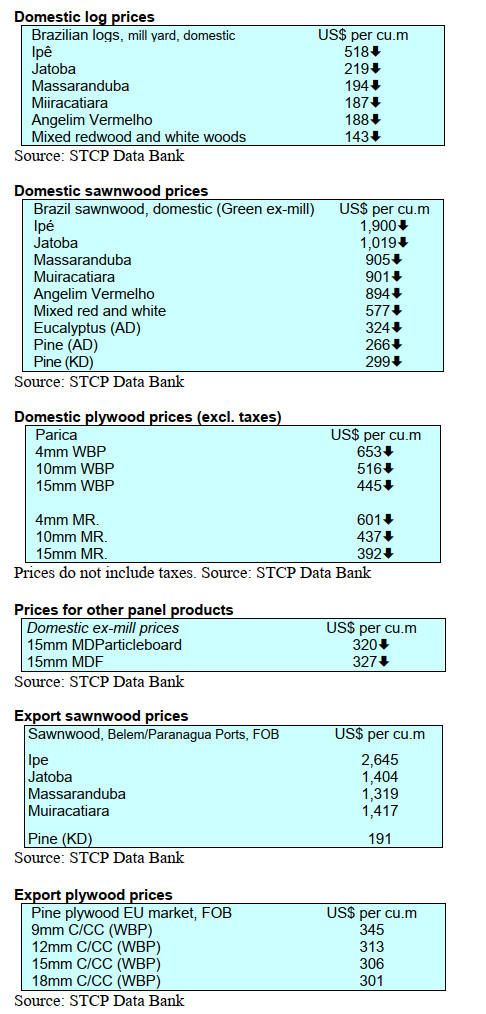

Through the eyes of industry
The latest GTI report lists the challenges identified by the private sector
in Brazil.
GGSC
https://www.itto-ggsc.org/static/upload/file/20240620/1718839024156844.pdf
9. PERU
Veneer and plywood exports see major decline
The Association of Exporters (ADEX) has reported
shipments of veneers and plywood in the first quarter of
2024 were valued at US$195,000 a contraction of a
massive 69% compared to the same period of 2023 when
they reached US$638,000.
The main market for veneer and plywood in the first
quarter was Mexico and it was the steep drop in orders in
this market that caused the overall decline in export
earnings. The second ranked market in terms of the value
of exports was Chile and for this market there was a 17%
decline in demand.
According to figures from the ADEX Data Trade
Commercial Intelligence System the other countries that
imported veneer and plywood from Peru dropped out of
the market in the first quarter of 2024.
Activities to raise productivity and improve
sustainability
The National Forestry and Wildlife Service (SERFOR)
and its Sustainable Productive Forests (BPS) programme
announced that in the second half of this year two projects
with high environmental, economic and social impacts
will be implemented in the Amazon Department. This was
announced during a Regional Forum ‘Ucayali:
Perspectives for a Prosperous and Sustainable Region’
organised by the Ucayali Regional Environmental
Authority within the framework of Environmental Week
2024.
The head of the Forest Project of SERFOR's BPS
programme reported that incentives will be targeted at
different users (indigenous communities, concessionaires,
organised producers and SMEs) in order to stimulate co-
finance for projects that increase production and
productivity for timber and non-timber products as well as
ecosystem services.
The Forests Project will provide technical assistance to
improve access to forest resources and thus increase the
area of sustainably managed forests.
Activities will focus on primary transformation and added
value production.
See: https://www.gob.pe/institucion/serfor/noticias/972354
ucayali-serfor-implementara-proyectos-para-poderar
producttividad-y-sostenibilidad-de-los-bosques
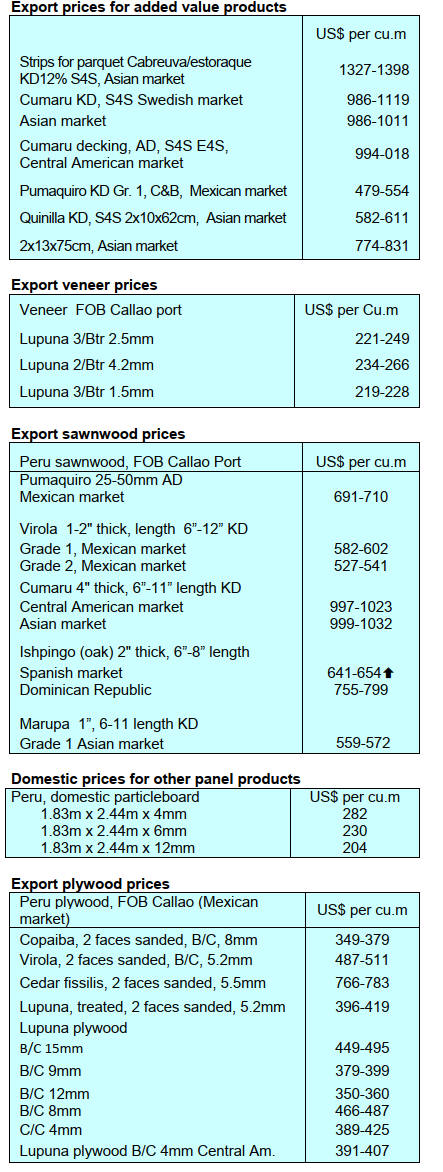
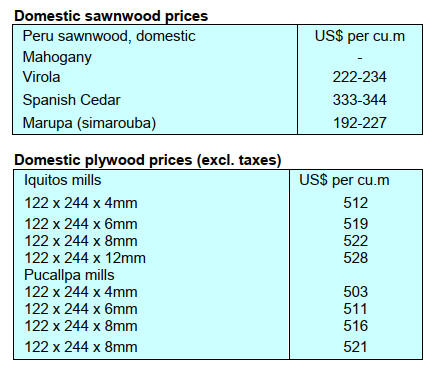
National Convention for Timber industrialists
The Association of Forestry Producers of Ucayali
(APROFU), the Chamber of Commerce of Ucayali and
CONAFOR (National Forestry Confederation of Peru)
together with Tropical Forest is organising the first
National Convention of Timber Industrialists set for 21
and 22 August in Pucallpa.
The themes of the convention are; role of the state as a
facilitator of the development of the forestry/timber sector,
development proposals for the forestry industry in Peru,
financing mechanisms for innovation in the forest industry
and panorama of national and international trade in the
wood sector
It should be noted that within the framework of the
Convention the new Forestry Agreement, which has
attracted much criticism, will be signed.
|